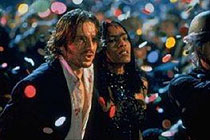|
|
|
|
Strange Days
|
 |
|
How many film lovers wince every time Quentin Tarantino blares publicly his favourite list of 'movie guys'? He means those male directors, such as John Woo, Sam Peckinpah and Martin Scorsese, who deliver tough, bloody stories in an explosive, kinetic, ultra-cinematic style. I have no problem with this tradition per se; in fact, I adore it as much as Quentin does. But I do wish his pantheon would stretch just once to include the women who rightfully belong in it, such as Penelope Spheeris and – especially – Kathryn Bigelow. Bigelow has had a remarkable career. She began in the world of avant-garde, conceptual art, and her first co-directed feature, The Loveless (1981) featuring Willem Dafoe as a sullen biker, is a disquieting gem of minimalist narrative. Her first genre film, Near Dark (1987), was a blast: a violent, perverse vampire film with a wicked sense of fun. Then her magnificent cop story Blue Steel (1990), starring Jamie Lee Curtis, brought her still closer to the mainstream – but on her own, proudly post-feminist terms. To an ardent Bigelow fan like myself, Strange Days is a devastating disappointment. She describes it as the sum of everything she has previously attempted – a radical mix of action, drama, left-wing politics and art theory. Even more obviously, she has designed it (with the help of scriptwriters James Cameron and Jay Cocks) as a whiz-bang, switched-on entertainment primed for the multiplex crowds. Unfortunately, every false note in Bigelow's previous, middling effort Point Break (1991) gets magnified tenfold in Strange Days. The jokes are bad. The elaborate reference to hot, topical events – such as the Los Angeles riots, or media controversies over rap music – is naïve and ham-fisted. At every point, the scenario – essentially a pretty mindless action-comedy-mystery number – is pumped up with cheap hysteria, pointless stylistic mayhem and endlessly woolly ideas. The central characters are contrived, supposedly iconic creations floating around in a laughable pop-fantasy world. Ralph Fiennes is Lenny Nero, an amoral, streetwise operator who deals in virtual reality discs – devices that allow anyone to relive a piece of someone else's direct, subjective experience. (If Strange Days serves one good purpose, it will be in encouraging film fans to dig out that great and largely unsung SF movie, Douglas Trumbull's Brainstorm [1983] – a story of visionary technology that is both conceptually rigorous and intensely, dramatically moving.) Tom Sizemore (from Heat, 1995) plays Lenny's best buddy – perhaps the shiftiest, most suspicious sidekick in cinema history. Juliette Lewis is Faith, an aspiring grunge-rock singer under the thumb of a strange, hyper-paranoid Svengali figure (Michael Wincott) – a show biz milieu that recalls that ludicrous "rock'n' roll fable" Streets of Fire (1984). And Angela Bassett is Mace, tough single mother and "security specialist" – whose inexplicably gooey, unrequited feelings for Lenny are anxiously telegraphed to the audience. A shocking case of rape and murder, and the subsequent, desperate search to uncover a serial killer, bring these characters (and many other looney cyberpunk-style dudes) together. Meanwhile, 1999 draws to a close and the possibility of either a millennial apocalypse or the revelation of massive government conspiracy is on everyone's freaked-out mind. Almost all the way through Strange Days, I kept hoping that its best elements would suddenly cohere and launch me into some ecstatic, stylised realm of daring melodrama – as Bigelow's finest films (Near Dark and Blue Steel) have done before. For there are promising touches, particularly at the start: the nervy energy of the actors, the hot-house atmosphere of ubiquitous street riots, the sudden switches in texture and viewpoint cued by the VR technology. And, as usual, Bigelow turns on the kinetic fireworks whenever violence looms. But this promise wears quickly, and is dashed completely in the absurd plethora of twists and turns in the final fifteen minutes. It is here that the film drops its chic pretence to anarchic subversion and extols a completely conservative ideology – sweeping the deep cause for social malaise right out of the picture. I give nothing of this mad finale away to point out one fleeting image, forever scarred into my memory: the shot of a male cop and a young female citizen kissing happily. Forget the erotic moment in Jim Jarmusch's Dead Man (1995) which disturbed Australian censors so profoundly; this is an infinitely more offensive spectacle. And extremely depressing, too, coming from an artist as skilled, vital and bold as Bigelow. MORE Bigelow: Wild Palms © Adrian Martin April 1996 |
![]()